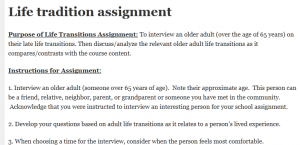Life tradition assignment

Purpose of Life Transitions Assignment: To interview an older adult (over the age of 65 years) on their late life transitions. Then discuss/analyze the relevant older adult life transitions as it compares/contrasts with the course content.
Instructions for Assignment:
1. Interview an older adult (someone over 65 years of age). Note their approximate age. This person can be a friend, relative, neighbor, parent, or grandparent or someone you have met in the community. Acknowledge that you were instructed to interview an interesting person for your school assignment.
2. Develop your questions based on adult life transitions as it relates to a person’s lived experience.
3. When choosing a time for the interview, consider when the person feels most comfortable.
4. Consider the length of time you will be taking.
5. Assure the interviewee that they may refuse to answer any question.
6. Be empathic and nonjudgmental. Remember that the person is honoring you by sharing his/her life story.
7. Write a 4-6-page paper analyzing the person’s lived experience. Do not use their name or location to maintain confidentiality.
8. Choose 4 or 5 late-life transitions that apply to your interviewee’s lived experience to analyze.
9. Utilize APA format.
10. The essay must include a title page, in-text citations, and a reference page. (Do not reference the course slides).
11. All work is expected to be your original work in your own words. All items copied from other sources must be quoted or paraphrased or summarized with appropriate citations or references. Academic honesty is expected and required of all Conestoga students. It is critical that you familiarize yourself with the Academic Offences Policy.
12. This assignment will be evaluated in terms of how you use the course content to interpret or explain what you described in the interview. What various life transitions occurred during this person’s older adult years?
13. Do not include the interview transcript in this assignment.
14. Review the rubric to ensure you have addressed all elements that will be evaluated.
Purpose of Life Transitions Assignment: To interview an older adult (over the age of 65 years) on their late life transitions. Then discuss/analyze the relevant older adult life transitions as it compares/contrasts with the course content.
Instructions for Assignment:
1. Interview an older adult (someone over 65 years of age). Note their approximate age. This person can be a friend, relative, neighbor, parent, or grandparent or someone you have met in the community. Acknowledge that you were instructed to interview an interesting person for your school assignment.
2. Develop your questions based on adult life transitions as it relates to a person’s lived experience.
3. When choosing a time for the interview, consider when the person feels most comfortable.
4. Consider the length of time you will be taking.
5. Assure the interviewee that they may refuse to answer any question.
6. Be empathic and nonjudgmental. Remember that the person is honoring you by sharing his/her life story.
7. Write a 4-6-page paper analyzing the person’s lived experience. Do not use their name or location to maintain confidentiality.
8. Choose 4 or 5 late-life transitions that apply to your interviewee’s lived experience to analyze.
9. Utilize APA format.
10. The essay must include a title page, in-text citations, and a reference page. (Do not reference the course slides).
11. All work is expected to be your original work in your own words. All items copied from other sources must be quoted or paraphrased or summarized with appropriate citations or references. Academic honesty is expected and required of all Conestoga students. It is critical that you familiarize yourself with the Academic Offences Policy.
12. This assignment will be evaluated in terms of how you use the course content to interpret or explain what you described in the interview. What various life transitions occurred during this person’s older adult years?
13. Do not include the interview transcript in this assignment.
14. Review the rubric to ensure you have addressed all elements that will be evaluated.